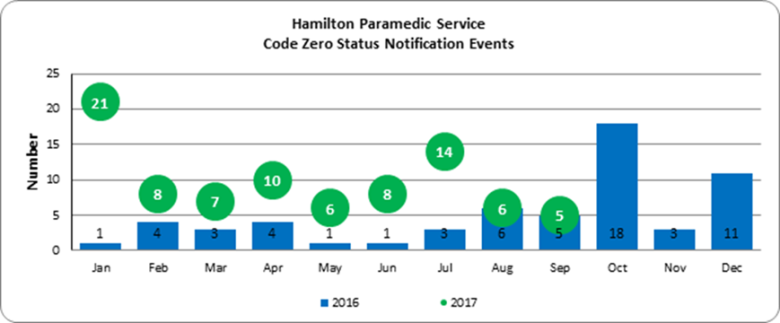Plummeting morale, increased absenteeism: Stress weighing on Hamilton paramedics
As demand rises, patients and paramedics alike are feeling the burden on emergency systems

Hamilton's paramedic service is close to a breaking point, according to one frontline paramedic, who says morale among EMS workers is sinking while pressures and demands mount.
Both the union representing workers and the Hamilton Paramedic Service itself say sick time and absences are getting worse, as local paramedics are burdened with increasing call volumes and no extra resources to meet rising demands.
Paramedics are often missing meal breaks, and working unwanted overtime at the end of a shift just to cover off emergency calls.
These stresses come as code zero incidents — which is when "one or less" ambulances across the service's entire fleet are available for a call — are rising at a rapid rate.
There have been 85 code zeros in Hamilton so far this year, which the city says is a 42 per cent increase over this time last year. Catherine Terry, 71, died of a heart attack during a code zero alert on July 10. It took 28 minutes from the initial call for paramedics to get to her.
I would say morale is at an all time low. Our work force is despondent and demoralized.- Mario Posteraro, President, OPSEU Local 256
All of this is taking a toll, says the paramedic, who spoke with CBC News on a condition of anonymity as he was not authorized to speak on the record.
"Nobody wants to come into work. We're starting to have shifts where we're short multiple people at the start of a shift," the paramedic said. "Just being down a few people, everyone in the city feels it."
"In 2006, a code zero was shocking. Now, we've become complacent, like this is normal."
Call volumes and challenges becoming worse, service says
In a statement, Paramedic chief Michael Sanderson said that the service is aware that "call volume pressures and challenges have become worse."
The paramedic service's annual report for 2016 shows a seven per cent demand increase in 911 calls in Hamilton last year, coupled with a cumulative increase of 35 per cent over the past seven years.
Those pressures are attributed in part to the city's aging population. Seniors only represent about 16 per cent of the Hamilton's population, but they accounted for 45 per cent of the demand on ambulances last year.

Hamilton has a higher than average percentage of people aged 65 and older, according to the latest available census data.
"We are aware that there has been an increase in sick time and absences for a variety of reasons," Sanderson said.
"We respect and continue to work with the union on areas of mutual concern and opportunities to improve the level of service as well as the work/life balance of our paramedics."
Mario Posteraro, president of Ontario Public Service Employees Union Local 256, which represents Hamilton's 322 paramedics, told CBC News that workers are "definitely at a crisis point."
"I would say morale is at an all time low. Our work force is despondent and demoralized," he said.

The local paramedic said that workers are now not even getting vacation time that they're owed, as management is not properly covering off those shifts.
"By not having those people, we're either entering code zeros, or the code zeros are lasting longer," the paramedic said.
Posteraro agreed, saying the union has filed "a number of grievances" for paramedics pushing for the vacation time they're owed.
"They're struggling and don't understand why they can't take off time they've earned," he said. "It's led to increased sick time."
'It's not just the hospitals'
In his statement, Sanderson said the paramedic service is "challenged by increased call volume pressures and hospital offload delays."
The union and the service both say those two factors are the largest contributors to problems for local paramedics, and the biggest cause of code zeros.
Offload delays refer to how long it takes for a paramedic to offload a patient from an ambulance to a hospital bed. In Hamilton, offloading times are routinely well above the provincial average — something that is largely attributed to funding cuts and overcrowding in hospitals.

The paramedic, however, says that call volumes and offload delays aren't the only issues causing code zeros. He feels management is also not allocating the resources it has properly.
"We have days when hospitals aren't busy that we're at a code zero event," he said. "It's not just the hospitals, and it's frustrating that those are the only excuses given."
Posteraro says that the union is "trying to work collaboratively with management" to resolve some of these problems.
"There are areas for improvement … it just hasn't happened quickly enough."

